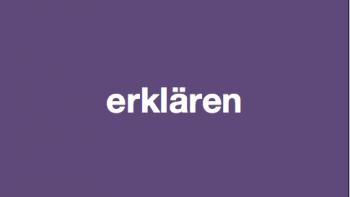Tag Archives: verb
The German Verb Sein – To Be (3 Tenses) Posted by Constanze on May 18, 2020

Guten Tag! If you’re a fairly new German learner, this post will benefit you as it covers one of the basics of the language. If you’re not new to the language, it’s still a good idea to revisit the basics from time to time! Today we’re looking at the verb sein (to be) and its…
The German Phrase ‘Es Passt’ Posted by Constanze on Feb 26, 2019

Guten Tag! In my last post I talked about the phrase ‘Es steht dir (gut)’, the German way of saying ‘It (really) suits you’. A question people often have when they learn this phrase is: What is the difference between saying ‘Es steht dir’ (it suits you) and a similar phrase, ‘Es passt dir’ (it…
Reflexive German Verbs Posted by Constanze on Jan 17, 2018

Guten Tag! Today we’re going to look at reflexive German verbs. If you’ve ever heard a German native say something like “I will shower me” in English instead of “I will take a shower”, for example, this post on reflexive verbs will hopefully explain why that is! What is a reflexive verb? A reflexive verb…
Talking About Hobbies in German Posted by Larissa on Oct 19, 2015
Servus, I got my inspiration for this post over on the Greek blog (which you can find here if you’re also interested in learning Greek). Hobbies are an important part of everyday life and are a great way to start up a conversation, whether it’s horse riding, painting, reading, or just going to the cinema!…
Key: Forming sentences with the German verb “hören” (Video) Posted by Sandra Rösner on Oct 6, 2014
Here is the key for the exercise on conjugating the German verb “hören”. In case you would like to listen to the correct sentences: check out the video. Präteritum – Preterit (equals simple past) 3a. I listened to the radio. Ich hörte Radio. 3b. I listened to music. Ich hörte Musik. 3c. I…
German grammar in use: The conjugation of the verb “erklären” Posted by Sandra Rösner on Sep 25, 2014
The common English translation for the German verb “erklären” is to explain. Further, it can mean to declare, to state, or to define — depending on context. Below you can find some example sentences with the German verb “erklären” and its conjugations. Präsens – Present tense Singular Plural 1st person ich erkläre wir erklären 2nd…
German grammar in use: The conjugation of the verb “sehen” Posted by Sandra Rösner on Sep 15, 2014
The German verb sehen (to see; to look; to face) is a strong verb, which means that it has another root vowel in the preterit. In the overview below you can find the conjugations of the verb sehen in the German tenses: Präsens, Imperativ, Präteritum, Futur I, Perfekt and Futur II. The additional examples are…




